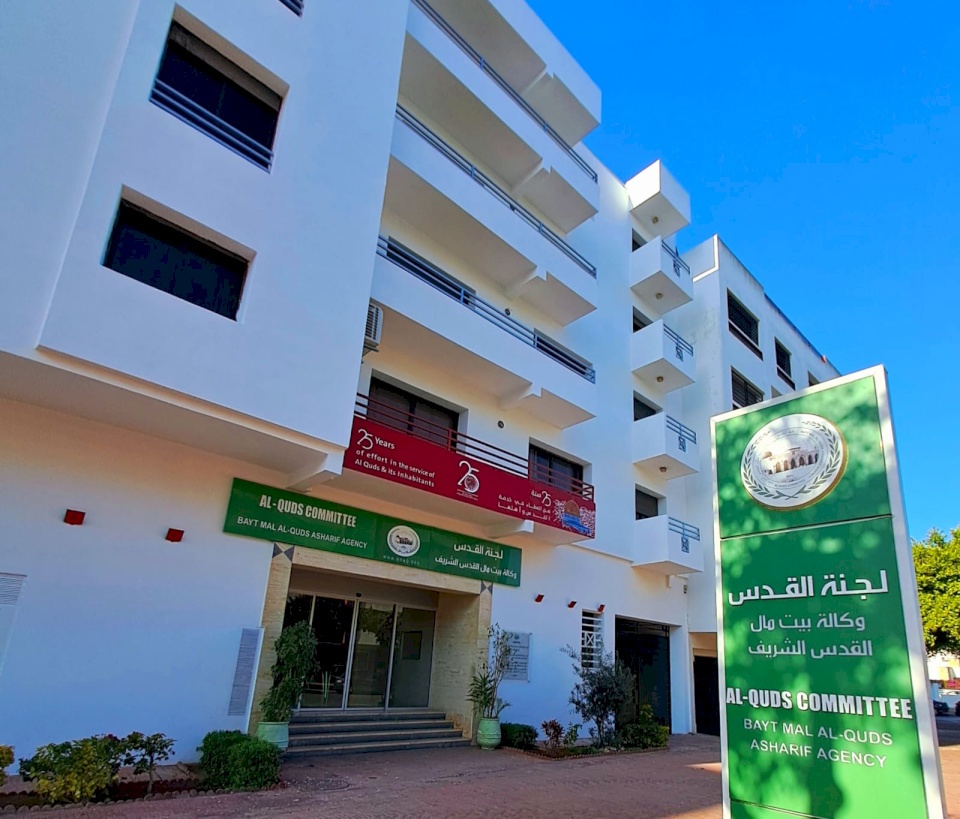
$2.2 Million Value of Al-Quds Agency Projects for the Benefit of the Palestinian Population During the First Half of 2025
SadaNews: The Al-Quds Agency announced that it has implemented several projects during the first half of 2025, within the framework of its commitments to support the Palestinian population, with a total budget of $2.2 million, of which $384,000 was directed to humanitarian relief campaigns in Gaza.
The agency explained in its semi-annual report for its work program in 2025 that despite the difficult conditions in Jerusalem and its surroundings, and the limited funding, the agency, which is affiliated with the Al-Quds Committee emanating from the Organization of Islamic Cooperation, continued its obligations to support the Palestinian population, following high directives from the Moroccan King Mohammed VI, the head of the Al-Quds Committee.
It added that given the alarming economic and social situation that has affected the living conditions of wide segments of Palestinians, the agency continued to carry out social assistance campaigns, support orphan sponsorship, and aid needy families, along with the annual support program directed at associations concerned with persons with disabilities, with a total budget of $703,000.
The agency also continued to support the education sector by preparing the campus of Al-Quds University in Beit Hanina with an amount of $421,000, funded by the Moroccan Association for Supporting Reconstruction in Palestine, and through a scholarship program for 331 Jerusalemite students at Al-Quds University, Al-Quds Open University, and the Modern University, with a budget of $135,000.
During this period, the agency funded two studies on “mental health” and “digital reality” for the benefit of the "Ribat" observatory for observation, tracking, and evaluation, affiliated with the agency in Jerusalem, and another on “conditions in Jerusalem under occupation,” for the Jerusalem Governorate, along with publishing two books titled "The Reality of Journalism and Journalists in Conflict Areas: The Example of Jerusalem and Palestine" and "Moroccans in Al-Quds" for a total amount of approximately $87,000.
For the second consecutive year, the agency continued to implement a support program for emerging Palestinian enterprises through the agency’s incubator for innovation and renewal projects "BMAQ BINHUB" for the benefit of the third group of Palestinian youth entrepreneurs, with a budget of approximately $410,000, funded by the Ministry of Digital Transition and Administrative Reform.
In addition, the agency allocated $78,000 during this period to finance children's programs for Jerusalem, including the launch of the "Hayya" application for children and youth in the virtues and values of Al-Quds, which features a series of animated episodes consisting of 10 episodes titled: "The Five Keys of Al-Quds," augmented reality stickers, talismans, and interactive books.
Among the club's activities, the agency recently organized the sixth edition of the "Colors of Al-Quds" competition, supported by the Ministry of National Education, Preschool Education, and Sports, and held the fifth edition of the "Simulation of the International Childhood Summit for Al-Quds" in collaboration with the Academy of the Kingdom.
On another note, as part of the national efforts exerted by the Kingdom of Morocco to assist Palestinians in Gaza, under the kind auspices of the Moroccan King, the agency, in cooperation with the "Irtiqa" Association for Local Development in Gaza, initiated humanitarian relief campaigns that have so far benefited 1,500 Palestinian families among the most needy displaced persons in Khan Younis, the camps in Gaza City, the coastal area, and the central governorate, including supplies of fresh vegetables, flour, oil, and legumes, with a budget of $150,000.
In this context, the agency funded a study on the epidemiological situation of skin diseases in Khan Younis and, subsequently, distributed quantities of medicines, ointments, and disinfectants to the displaced, with a budget of $34,000.
The agency continues to follow up on the support it provided to the Palestinian educational system in Gaza through Al-Azhar University, which regained university documents and student files, storing them on secure cloud servers provided by the agency. Preparations are being made to generalize this experience to other university institutions in the sector.
The agency is also evaluating the experience of the distance learning platform, which enabled thousands of university students from various faculties, who managed to access the internet, to catch up on some delays in their courses and educational subjects, in addition to allocating scholarships to eight students from King Hassan II College of Agricultural and Environmental Sciences in Gaza who are completing their final year at the Hassan II Institute of Agronomy and Veterinary Medicine in Rabat, in the fields of veterinary medicine and animal production.
Furthermore, in coordination with the competent Palestinian Authority represented by the Ministry of Social Development in Ramallah, the agency has begun to fulfill its commitments regarding the care of 45 cases of Palestinian children with amputations, with a budget of $200,000, funded by the Ministry of Social Integration, Solidarity, Family, and the Moroccan Association for Supporting Reconstruction in Palestine, as part of 300 cases the agency committed to caring for with its partners.
The agency has also begun to care for 500 orphan children from Gaza with complete sponsorship, providing monthly grants of $150 for each beneficiary, including additional support during holidays and religious occasions, as well as during the start of the school year each year.
The agency is also preparing to launch a psychological clinic – once the security situation stabilizes in the Gaza Strip – to support children in difficult situations, especially orphans and amputees, and assist them in reintegration into their social environment, in collaboration with local institutions.

Palestine Bank Supports Steps for Sports Development Programs

Flow Ventures Launches 'Flow Angels' to Activate Early Angel Investments of Up to $2 Milli...

Palestine Bank Supports the 15th Edition of the United Nations Simulation Conference (PalM...

وفد من جامعة فلسطين الأهلية يزور جامعة النجاح الوطنية ويوقّع اتفاقية تعاون أكاديمي مشترك

Arab Bank Funds Construction of the Largest Solar Power Plant in Palestine with a Capacity...

Nua'allim Foundation for Palestine Delivers Laptops to the National Institute for Educatio...

National Bank Renews Cooperation with New Cash Company
